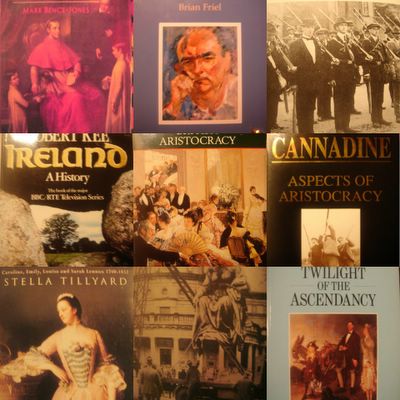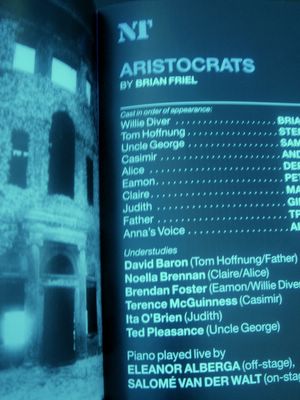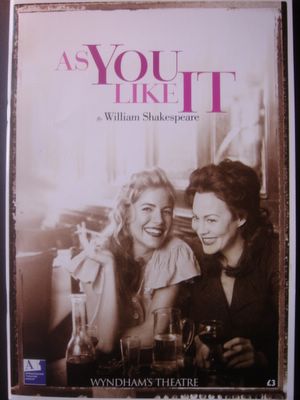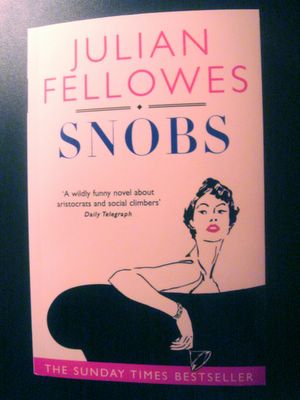The Bottomlessness of Romantic Love... WestEnding in London...
WestEnding in London... 
In order to broadened the mind of the Honourable Reader, and for other small reasons one does not want to share with the virtual space's population, this blogger of yours has decided
to spend a weekend in London. As usual, Theatre was up there in the top priorities' list.
Internet-booked from home, sometime ago, I ended up, to my surprise, attending the final night of
the most recent "As You Like It" in the West End, which is in itself a charming thing.
(All the staff of the theatre - program sellers, ice-cream-providers, cloakroom girls and good-spirited bartenders included - came to the front rows after the finale, applauding the actors with what looked genuine bonding; Ms. Sienna Miller could not hide her tears - as her first foray into the West End world was coming to an end).
My general state of enchanted beatitude during the performance was pierced by the word "Portugal" on a line from Rosalind in the end of Act IV :
ROSALIND: O coz, coz, coz, my pretty little coz, that thou didst know how many fathom deep I am in love! But it cannot be sounded: my affection hath an unknown bottom, like the bay of Portugal.Having decided to investigate further this (inexistent) "Bay of Portugal" mistery, my googling efforts were nil. In desperation, I turned to a Barnes & Noble friendly study guides' service called SparkNotes. To log in I had to choose yet another password. This time I used "Moydroog", as a private joke between me and Miss Boots. Finally I was able to put on my enquiry:
The bottomlessness of the bay of Portugal posted by Moydroog on 9/20 5:51 AM
Saw "As you like it" last week in the West End and get acquainted to the line, by Rosalind, "how many fathom deep I am in love! But it cannot be sounded: my affection hath an unknown bottom, like the bay of Portugal.". As Portuguese I would like to know what made WS choose that particular metaphor to bottomlessness (shipwrecks?, common knowledge among mariners?. No amount of googling got me there yet. Any hint?
The following day I got an answer from Clif:
Apparently the Bay of Portugal is unusually deep, and would have been unsoundable by the plumbing methods of Shakespeare's time. But also, there would have been many Portuguese living in England in Shakespeare's time and he surely would have met some of them, and would have been impressed by the emotional depth of Portuguese in general, and especially of the women, in matters of the heart.
How about that?!
Well, I thought I had enough material for my blogpost on this "As You Like It" and I had already started to pen-push it when I had a "breaking news" e-mail alert from Gmail telling me someone else had SparkNoted me. Bingo!
That's what SonnetCLV wrote:
Where, exactly, is the Bay of Portugal? I was prompted by this query to re-read Scene 1 of Act IV of As You Like It, still my favorite Shakespeare comedy (and one which I've had the pleasure to both direct and act in, on separate occasions). I found the quotation near the end of this delightful scene, a scene which features my favorite line in the play, a line again spoken by the inimitable Rosalind: "Men have died from time to time, and worms have eaten them, but not for love." Rosalind is a wit, and IV,1 reveals her wit to its highest nature. Even when the comedy shifts to the more serious tone at the end of the scene, instigated by Orlando's exit and Celia's comment to Rosalind "You have simply misused our sex in your loveprate," Rosalind maintains her wit. She can say of Cupid: "...that same wicked bastard of Venus that was begot of thought, conceived of spleen, and born of madness, that blind rascally boy that abuses every one's eyes because his own are out -- let him be judge how deep I am in love." Yet, she immediately adds: "... I cannot be out of the sight of Orlando. I'll go find a shadow, and sigh till he come." I present this rather antithetical nature of Rosalind to demonstrate that it is difficult to determine if she is serious or punning when she says to Celia: "My affection hath an unknown bottom, like the Bay of Portugal." I take the first part of her remark as the serious, but the second part I see as a sort of snipe against the Portugese themselves. Which brings me to ponder: where and what is the bay of Portugal? Is there such a place? Or was Shakespeare thinking of something altogether different? Did Shakespeare's audience get a chuckle from the line? I think so. Relations between Portugal and England had its ups and downs through the English Tudor years. At one time allies, the two countries ended in disputes when Spain conquered Portugal. Spain remained no strong friend to Elizabethan England. The battle of the Spanish Armada says much. But what of Portugal? Portugal had long been a leader in exploration of the seas. Since the days of Vasco de Gama, the Portugese led exploration. They were commanders of the sea, stronger than both Spain and England when at their strongest. Portugal ruled the waves. Shakespeare was a fond reader of the journals that resulted from the various sea farers journeys. We know he made references to the happenings of these journals in various plays. (I believe I once posted at SparkNotes on the topic of the ship the Tiger in the play Macbeth, a post relating to this topic.) Indeed, some scholars speculate that As You Like It is a play themed on new world exploration. (You'll find notes on this very topic on the internet. ) Some of the extant journals from Shakespeare's era make mention of "the bay of Portugal". (You'll find a couple of these on the internet, too.) In any case, where was this bay of Portugal? My own sense is that the English refer to "the bay of Portugal" as a sarcastic term to represent the Atlantic Ocean itself -- the body of water between Portugal and the Canary Islands and Virginia in the New World. I take it as a derogatory term, as if the Portuguese, who indeed were once a major sea power, claimed that the entire Atlantic were their personal bay. If you look at old maps, you'll see that the Portuguese commanded the African and South American coasts. Thus, the waters between them make a sort of great bay. It is very deep, and was unsoundable by any methods Elizabethan seamen had at their disposal. I think Rosalind solicits a chuckle from her English audience when she mentions "the bay of Portugal." The English take the term to mean the Portuguese pretentious claim of the ocean as their own. This idea would fit well with the temperament of Rosalind and the context of her line. In any case, it brings a chuckle to me.
I hope the Honourable Reader might be leaning to agree with me that the Internet is much more than a cheap tool to have access to pornography or a dismal source of unsolicited heavy-junked mail.
As to the fatidic line that started it all, I can only speculate further. When will we find the robotic miniSubmarine-like device equipped with the right type of "sonar" technology that will be able to probe the depths of one's true great love?













